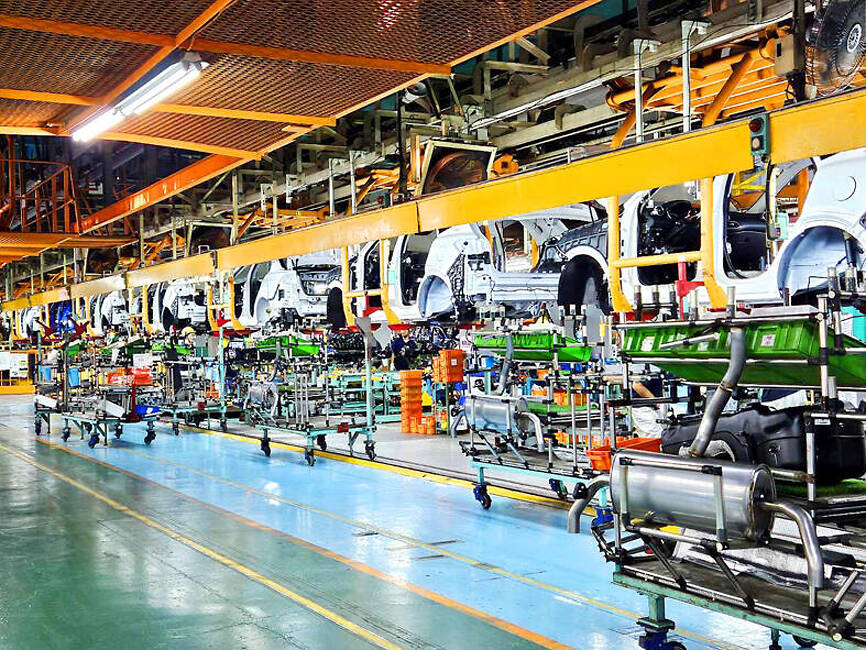The US’ tariff polices are expected to hurt Taiwan’s old-economy industries more than their tech counterparts, as it is harder for the traditional industrial sector to relocate production to the US to avoid tariffs, economics experts said.
The White House on Friday announced a 20 percent blanket tariff on Taiwan, down from the 32 percent it unveiled on April 2.
The government said the 20 percent is provisional and that it is seeking a lower levy through further negotiations.

Photo courtesy of the Taiwan Transportation Vehicle Manufacturers Association
Chung-Hua Institution for Economic Research (CIER) vice president Wang Jiann-chyuan (王健全) on Friday said that US President Donald Trump’s tariff policies seek to encourage manufacturers to invest in the US and make“made in the US” products.
“However, not all local industries can afford to move to the US,” he said. “Old-economy industries would not be able to avoid the high tariffs imposed by the Trump administration and would bear the brunt of the levy, as they do not have sufficient US investments.”
An industry that wants to expand to the US needs a high gross margin to cushion high product costs abroad and must have advanced automation to deal with the labor shortage there, Wang said.
That industry also needs to build a cluster and forge a comprehensive supply chain in the US market, and its investments must meet demand, he added.
High-tech industries such as chip makers, integrated circuit packaging and testing providers, and artificial intelligence suppliers have the capability to expand to the US, but many old-economy firms would be left behind, Wang said.
Unlike contract chipmaker Taiwan Semiconductor Manufacturing Co, which is investing US$65 billion in Arizona and has pledged to invest an additional US$100 billion in the state, with a gross margin of 50 percent, many old-economy companies only have a gross margin of less than 10 percent or even 3 to 4 percent, he said.
“It is hard for old-economy manufacturers to follow tech giants and move production to the US,” Wang said.
Since 2022, many old-economy industries had invested large amounts in Southeast Asian countries, as many of their customers asked them to go there under the “Taiwan plus one” initiative, he said.
“Now several Southeast Asian countries also face US tariffs, and their rates are at about the same level as Taiwan’s, so it would not be cost-efficient for Taiwanese old-economy firms to go there,” Wang said, referring to a 20 percent levy for Vietnam, and 19 percent for Thailand and Cambodia.
In addition to the US tariffs, Taiwanese traditional manufacturers have to deal with things such as the need to build an industrial cluster, and deal with labor and electricity issues in Southeast Asia, he said.
The old-economy sector would also be affected by the appreciation of the New Taiwan dollar, which has soared 9.18 percent against the greenback since the beginning of the year, Wang said.
Supply Management Institute head Pai Tsung-cheng (白宗城) said that many old-economy industries, which are already in trouble, are expected to go from bad to worse due to the tariffs and foreign exchange losses.
Some manufacturers have given up due to small profit margins, but their products are fundamental to many industries, Pai said, referring to producers of fasteners such as screws and bolts.
“The government should not ignore traditional industries, as many, including hand machines, machine tools and metal parts makers, are likely to be hit hard by the tariff,” Pai said. “These old-economy firms could go under without assistance, which would dent the supply chain.”

POSITIVE DEVELOPMENT: Japan and the US are expected to hold in-depth discussions on Taiwan-related issues during the meeting next month, Japanese sources said The holding of a Japan-US leaders’ meeting ahead of US President Donald Trump’s visit to China is positive news for Taiwan, former Japan-Taiwan Exchange Association representative Hiroyasu Izumi said yesterday. After the Liberal Democratic Party’s landslide victory in Japan’s House of Representatives election, Japanese Prime Minister Sanae Takaichi is scheduled to visit the US next month, where she is to meet with Trump ahead of the US president’s planned visit to China from March 31 to April 2 for a meeting with Chinese President Xi Jinping (習近平). Japan and the US are expected to hold in-depth discussions on Taiwan-related issues during the

‘LIKE-MINDED PARTNER’: Tako van Popta said it would be inappropriate to delay signing the deal with Taiwan because of China, adding he would promote the issue Canadian senators have stressed Taiwan’s importance for international trade and expressed enthusiasm for ensuring the Taiwan-Canada trade cooperation framework agreement is implemented this year. Representative to Canada Harry Tseng (曾厚仁) in an interview with the Central News Agency (CNA) said he was increasingly uneasy about Ottawa’s delays in signing the agreement, especially as Ottawa has warmed toward Beijing. There are “no negotiations left. Not only [is it] initialed, we have three versions of the text ready: English, French and Mandarin,” Tseng said. “That tells you how close we are to the final signature.” Tseng said that he hoped Canadian Prime Minister Mark Carney

President William Lai (賴清德) yesterday bestowed one of Taiwan’s highest honors on Saint Vincent and the Grenadines (SVG) Ambassador Andrea Clare Bowman in recognition of her contributions to bilateral ties. “By conferring the Order of Brilliant Star with Grand Cordon on Ambassador Bowman today, I want to sincerely thank her, on behalf of the Taiwanese people, for her outstanding contribution to deepening diplomatic ties between Taiwan and SVG,” Lai said at a ceremony held at the Presidential Office in Taipei. He noted that Bowman became SVG’s first ambassador to Taiwan in 2019 and

A man walks past elementary school artworks at the Taipei Lantern Festival in Ximen District yesterday, the first day of the event. The festival is to run from 5pm to 10pm through March 15.